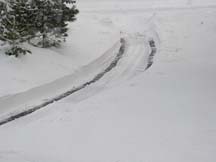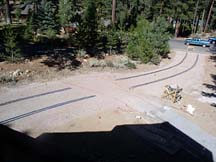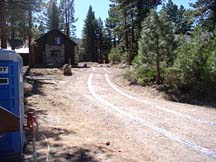

Overview of Delta-Therm's Snow Melting System
The Delta-Therm Snow Melting System consists of electric heating cables embedded in the driveway, sidewalk, stairs and/or entry pavement. The Delta-Therm DTC Snow Melting control monitors surface moisture, as well as surface and air temperatures. As outdoor conditions warrant, the heating cables are automatically switched on and off. When the cables are on, they warm the pavement above 32
The System In Use
To combat the fierce winter snowstorms of Reno, NV, homeowner Kevin Murray selected and installed a Delta-Therm Snow Melting System, which was very fortunate since Reno had a record 12 inches of snowfall from Jan. 1-15, 2005. One of the photos here was taken after one such storm.Kevin Murray's driveway is 130' x 10', 1,300 square feet with a sidewalk running across the middle of it.
He chose the Delta-Therm MI Snow Melting System for various reasons. Keeping cost in mind, Delta-Therm designed the snowmelting system to melt two tire tracks leading from the garage to the street, as well as the garage apron slab. By covering only 390 square feet of tracks and the 100 sq.-ft. apron, Delta-Therm was able to cut the costs (materials, labor, and operating) by more than half of what it would cost to equip the entire driveway with snowmelting cables. This also lowered the electrical service requirement.
To avoid the existing sidewalk, the driveway was split into five separate zones. Zone 1 is the 100 sq.-ft. apron; zones 2 and 3 are the two tire treads (1.5' wide x 40' long) leading from the garage to the sidewalk; zone 4 and 5 are the two tire treads (1.5' wide x 90' long) leading from the other side of the sidewalk to the street.
The snowmelting system is designed to output nominal 50 watts per sq.-ft. or 157 btus, which typically can keep up with a snow falling rate of two inches per hour. Delta-Therm snowmelting systems can be engineered to output up 70 watts per sq.-ft. or 219 btus per sq.-ft. for critical areas such as handicap ramps, pedestrian bridges or hospital helicopter pads.
The MI snow melting cable assemblies are controlled by a DTC120-S snowmelting control, which consists of a one DTC control panel, one main slab (MS) moisture/temperature sensor, and one OTS-F5 ambient thermostat.
A contactor panel and embedded heating system plaque (National Electrical Code requirement) were also installed.
The annual cost to operate the system, based on Reno's 11-cents-per-kilowatt-hour electric rate, is approximately $160. This is based on 63 hours of snowmelting at a rate of two inches per hour. The 63 hours is taken from the ASHRAE handbook snowmelting table, which states that Reno averages 63 hours of snowmelting annually.